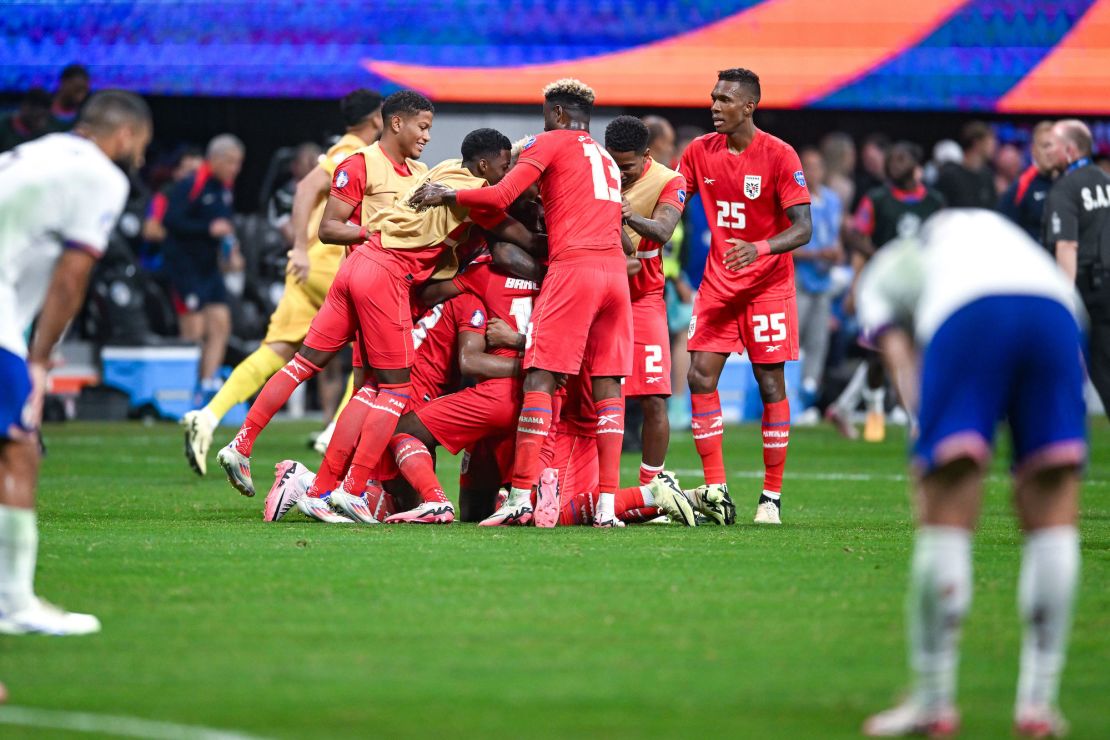
U.S. Soccer said it was “deeply disturbed” by the racist abuse directed at two of the men’s national team’s players following it’s surprise 2-1 defeat by Panama at the 2024 Copa América in Atlanta on Thursday.
Defender Chris Richards and striker Folarin Balogun posted on their Instagram stories the racist messages they had received over the social media platform.
In a statement posted on its X account, U.S. Soccer said it was “aware of and deeply disturbed by the racist comments made online and directed at several of our men’s national team players following tonight’s match.”
“There is absolutely no place in the game for such hateful and discriminatory behavior. These actions are not only unacceptable but also contrary to the values of respect and inclusivity that we uphold as an organization.
“U.S. Soccer stands firmly against racism in all forms and will continue to support our players.”
CNN has reached out to both players to offer them the opportunity to comment as well as Meta, which owns Instagram.
When previously contacted by CNN, Meta referred CNN to its guide which was released ahead of the 2022 World Cup on how the company is protecting footballers on its apps.
That includes – among other safety features – turning off direct message requests, limiting who can comment on posts and hiding certain offensive words or phrases.
Earlier in June, soccer’s global governing body FIFA reinforced its commitment to fighting online abuse, in particular through its Social Media Protection Service (SMPS).
The SMPS is a tool which FIFA says protects individuals in soccer from online abuse by hiding hate speech.
FIFA says that since it was launched in 2022, the SMPS tool has analyzed 30 million posts and comments on 3,381 player and 160 team accounts across 11 of its events and hidden 2.6 million abusive comments from public view with the most harmful – 30,883 cases – being reported to social media platforms, “triggering real-world actions, including account suspensions.”
“Hate speech and abusive content on social media can have a significant impact on players, affecting mental health, performance and their friends and families. FIFA’s priority is to protect players and make football a safe space,” said soccer’s world governing body.
Upset
Both Richards and Balogun started the game against Panama at Mercedes-Benz Stadium in Atlanta, with Balogun opening the scoring in the first half in stunning fashion.
Balogun’s goal came four minutes after the US had been reduced to 10 men. Striker Tim Weah had initially received a yellow card for an off-the-ball elbow on a Panama opponent but it was upgraded to a red following a video assistant referee (VAR) intervention.
César Blackman equalized for Panama just minutes later, finishing from the edge of the box to score his first international goal.
Midway through the second half, Panama thought it had a penalty only for VAR to once again intervene and the decision was overturned.
Panama eventually made its numerical advantage count when José Fajardo swept home to capitalize on a period of Panamanian pressure in the 83rd minute.

Panama also went down to 10 men before the end of the game after Adalberto Carrasquilla was sent off for a heavy challenge on Christian Pulisic.
After a win and a defeat from its opening two games of the Copa América, the US sits second in its group, three points behind Group C leaders Uruguay and level on points with Panama.
The US team needs to better Panama’s result in the final group games if it is to qualify for the knockout stages.
The US plays Uruguay while Panama faces Bolivia on Monday, July 1 in Group C’s conclusion.
“Moving forward, we need to control our emotions in certain situations,” US midfielder Tyler Adams said afterwards, per Reuters. “I think the team fought for everything after we got the red card. You definitely can’t fault the effort.
“By winning the first game, we put still ourselves in a position that we can have everything to play for in the last game.”
After the game, Weah apologized for his actions which resulted in a red card, saying he “let my team and my country down.”
“A moment of frustration led to an irreversible consequence, and for that, I am deeply sorry to my teammates, coaches, family and our fans,” the Juventus striker wrote on Instagram.“Moving forward, I am committed to learning from this experience, not allowing an opponent to provoke me, and working to regain the trust and respect of my team and supporters.
“No matter what I will always fight for my team and my country till the day I’m no longer needed or capable to!! I Sincerely apologize to everyone. My love for this team goes beyond just football and I’m so sad and angry at myself for putting my brothers through what they went through tonight.”


